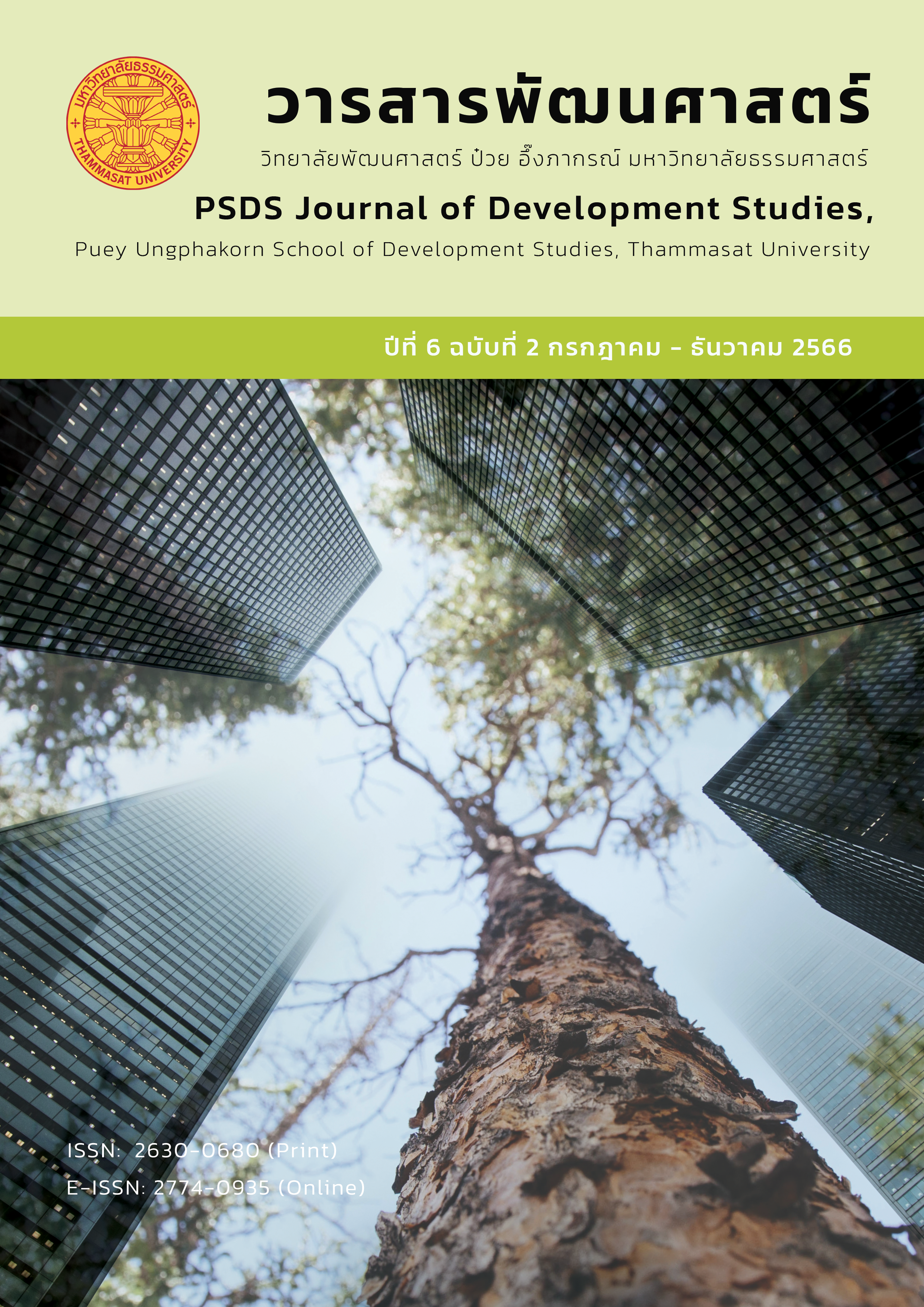พลังงานหมุนเวียนและความคลุมเครือของการเปลี่ยนผ่านพลังงาน
คำสำคัญ:
พลังงานหมุนเวียน, การเปลี่ยนผ่านพลังงาน, พลังงานสะอาด, สกัดนิยมบทคัดย่อ
บทความนี้ศึกษาประวัติศาสตร์ทางความคิดของการใช้ “พลังงานหมุนเวียน” เป็นเครื่องมือไปสู่เป้าหมาย “การเปลี่ยนผ่านพลังงาน” ในประเทศเยอรมนี และปฏิบัติการจริงที่เกิดขึ้นของกรณีศึกษาที่นำนวัตกรรมการรับซื้อไฟฟ้าจากผู้ผลิตเอกชนไปใช้ส่งเสริมโครงการพลังงานหมุนเวียน งานวิจัยนี้ใช้วิธีการวิจัยเชิงคุณภาพในการเก็บรวบรวมข้อมูล ผ่านการวิจัยเอกสารต่าง ๆ ที่เกี่ยวข้อง งานชิ้นนี้เสนอว่าต้นแบบการเปลี่ยนผ่านพลังงานและการสร้างประชาธิปไตยด้านพลังงานเกิดจากการทำงานร่วมกันอย่างสอดคล้อง ระหว่างเทคโนโลยี ระบบบริหารพลังงาน โครงสร้างสังคม และวัฒนธรรมทางการเมือง การพัฒนาพลังงานหมุนเวียนและการรับซื้อไฟในกรณีศึกษาอื่นกลับให้ผลลัพธ์ที่แตกต่าง เพราะโครงการเหล่านี้ยังทำงานอยู่ในระบบนิเวศทุนนิยม เศรษฐกิจแบบสกัดนิยม และความสัมพันธ์ทางการเมืองที่ไม่เท่าเทียม โครงการพลังงานหมุนเวียนในหลายกรณีจึงถูกต่อต้าน เพราะสร้างผลกระทบทางสังคมและสิ่งแวดล้อม สถานะการเป็นพลังงานสะอาดจึงเต็มไปด้วยความคลุมเครือ การเพิ่มแหล่งพลังงานใหม่ที่เร่งให้ใช้พลังงานเพิ่มขึ้นอาจเป็น “การสะสมพลังงานพลังงานเพิ่ม” มากกว่าจะเป็นการเปลี่ยนผ่านพลังงาน
Downloads
เอกสารอ้างอิง
กฤติยาพร วงษา. (2557). อนาคตพลังงานไทย. เชียงใหม่: สถาบันศึกษานโยบายสาธารณะ มหาวิทยาลัยเชียงใหม่.
Abram, S., Winthereik, B. R., & Yarrow, T. (2019). Current thinking – an introduction. In Electrifying Anthropology. https://doi.org/10.5040/9781350102675.0006
Argenti, N., & Knight, D. M. (2015). Sun, wind, and the rebirth of extractive economies: Renewable energy investment and metanarratives of crisis in Greece. Journal of the Royal Anthropological Institute, 21(4). https://doi.org/10.1111/1467-9655.12287
BNEF. (2023). Energy Transition Investment Trend 2023: Tracking global investment in the low-carbon energy transition. https://about.bnef.com/energy-transition-investment/#toc-report
Boyer, D. (2015). Anthropology Electric. Cultural Anthropology, 30(4), 531–539. https://doi.org/10.14506/ca30.4.02
Boyer, D., & Howe, C. (2019). Energopolitics: Wind and Power in the Anthropocence. Duke University Press.
Bridge, G., Bouzarovski, S., Bradshaw, M., & Eyre, N. (2013). Geographies of energy transition: Space, place and the low-carbon economy. Energy Policy, 53. https://doi.org/10.1016/j.enpol.2012.10.066
Dracklé, D., & Krauss, W. (2011). Ethnographies of Wind and Power. Anthropology News, 52(5), 9. https://doi.org/https://doi.org/10.1111/j.1556-3502.2011.52509.x
DSTATIS. (2023, March 9). Electricity production in 2022: coal accounted for a third, wind power for a quarter. Https://Www.Destatis.de/EN/Press/2023/03/PE23_090_43312.Html.
DW News. (2022, October 17). Germany Extends Lifetime of Remaining Nuclear Plants. Retrieved from https://www.dw.com/en/germany-extends-lifetime-of-all-3-remaining-nuclear-plants/a-63466196
Grayson, M. (2017). Energy transitions. Nature, 551(7682), S133–S133. https://doi.org/10.1038/d41586-017-07507-y
GTAI. (2023, December 19). Germany’s Wind Energy Industry - Opportunities in a Sustainable Business Environment. https://www.gtai.de/en/invest/industries/energy/wind-energy
Günel, G. (2022). Accumulation: Exploring the Materiality of Energy Infrastructure BT - The Palgrave Handbook of the Anthropology of Technology (M. H. Bruun, A. Wahlberg, R. Douglas-Jones, C. Hasse, K. Hoeyer, D. B. Kristensen, & B. R. Winthereik (eds.); pp. 689–702). Springer Nature Singapore. https://doi.org/10.1007/978-981-16-7084-8_35
High, M., & Smith, J.M. (2019). Introduction: The Ethical Constitution of Energy Dilemmas. Journal of the Royal Anthropological Institute, 25(S1), 9-28.
Howe, C. (2019). Ecologics. Duke University Press. https://doi.org/10.1215/9781478004400
Huber, M. (2013). Lifeblood: Oil, Freedom, and the Forces of Capital. Minneapolis: University of Minnesota Press.
IRENA. (2002). Renewable Power Generation Costs in 2021. International Renewable Energy Agency.
Johnstone, B. (2011). The Unsung Hero of Germany’s Solar Miracle | Greentech Media.
https://www.greentechmedia.com/articles/read/the-unsung-hero-of-germanys-solar-miracle
Johnstone, P., & Stirling, A. (2020). Comparing nuclear trajectories in Germany and the United Kingdom: From regimes to democracies in sociotechnical transitions and discontinuities. Energy Research & Social Science, 59, 101245. https://doi.org/https://doi.org/10.1016/j.erss.2019.101245
IRENA. (2002). Renewable Power Generation Costs in 2021. International Renewable Energy Agency.
Kuzemko, C. et al., (2016). Governing for sustainable energy system change: Politics, contexts and contingency. Energy Research and Social Science, (12), 96–105. http://dx.doi.org/10.1016/j.erss.2015.12.022.
Leach, M., Scoones, I., & Stirling, A. (2010). Dynamic Sustainabilities. Routledge. https://doi.org/10.4324/9781849775069
Love, T., & Isenhour, C. (2016). Energy and economy: Recognizing high-energy modernity as a historical period. In Economic Anthropology (Vol. 3, Issue 1). https://doi.org/10.1002/sea2.12040
Malm, A. (2016). Fossil Capital: The Rise of Steam Power and the Roots of Global Warming. New York: Verso.
Middleton, C. & Ketelsen, T. (2022). Pathways to a Sustainable and Just Transformation of the Mekong Region’s Electricity Sector. Bangkok and Perth: Center for Social Development Studies, Faculty of Political Science, Chulalongkorn University and the Australia-Mekong Partnership for Environmental Resources and Energy System.
Morris, C., & Jungjohann, A. (2017). Energize the people to effect policy change. Nature, 551(7682). https://doi.org/10.1038/d41586-017-07508-x
Nadaï, A., Krauss, W., Afonso, A. I., Dracklé, D. H., Oliver, L., & Mendes, C. (2015). A Comparison of the Emergence of Wind Energy Landscapes in France, Germany and Portugal. In Yves Luginbühl, Peter Howard, & Daniel Terrasson (Eds.), Landscape and Sustainable Development. The French Perspective (pp. 133-144). London: Ashgate.
Rignall, K. E. (2015). Solar power, state power, and the politics of energy transition in pre-Saharan Morocco. Environment and Planning A: Economy and Space, 48(3), 540–557. https://doi.org/10.1177/0308518X15619176
Scheer, H. (2004). The Solar Economy: Renewable Energy for a Sustainable Global Future. London: Earthscan.
Sovacool, B. K. (2016). How long will it take? Conceptualizing the temporal dynamics of energy transitions. Energy Research & Social Science, 13, 202–215.
https://doi.org/https://doi.org/10.1016/j.erss.2015.12.020
Strauss, S., Rupp, S., & Love, T. (2014). Powerlines: Cultures of Energy in the Twenty-first Century. In Sarah Strauss, Stephanie Rupp, & Thomas Love (Eds.), Culture of Energy: Power, Practices, Technologies (pp. 10-30). Walnut Creek: Left Coast Press Inc.
Thombs, R. P. (2018). Has the relationship between non-fossil fuel energy sources and CO2 emissions changed over time? A cross-national study, 2000–2013. Climatic Change, 148(4), 481–490. https://doi.org/10.1007/s10584-018-2215-1
Timothy, M. (2011). Carbon Democracy: Political Power in the Age of Oil. New York: Verso.
York, R., & Bell, S. E. (2019). Energy transitions or additions?: Why a transition from fossil fuels requires more than the growth of renewable energy. Energy Research & Social Science, 51, 40–43.
ดาวน์โหลด
เผยแพร่แล้ว
รูปแบบการอ้างอิง
ฉบับ
ประเภทบทความ
สัญญาอนุญาต
ลิขสิทธิ์ (c) 2023 ประเสริฐ แรงกล้า

อนุญาตภายใต้เงื่อนไข Creative Commons Attribution-NonCommercial-NoDerivatives 4.0 International License.






